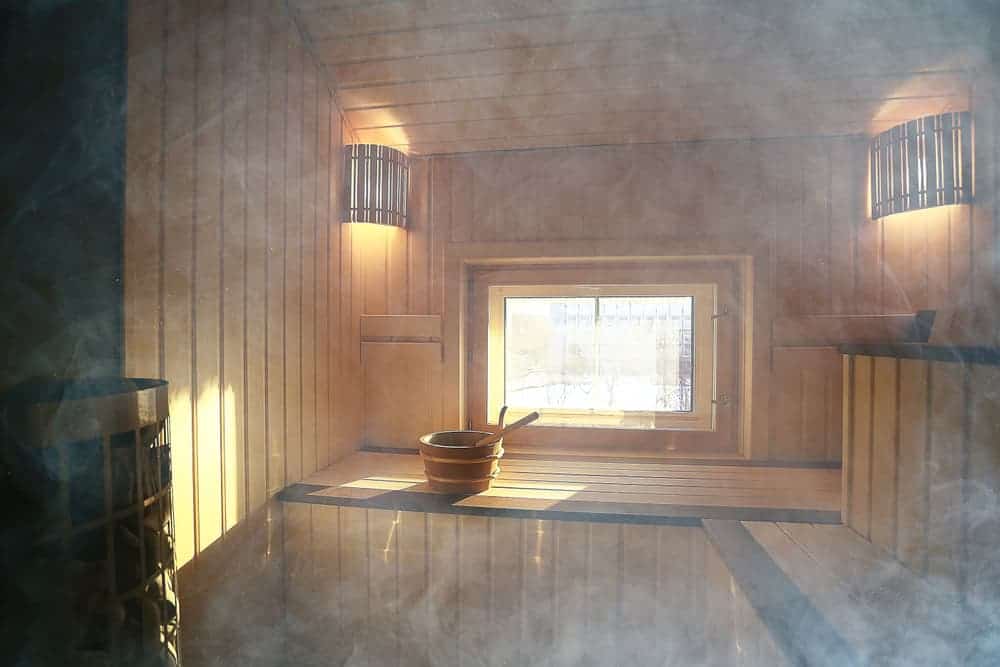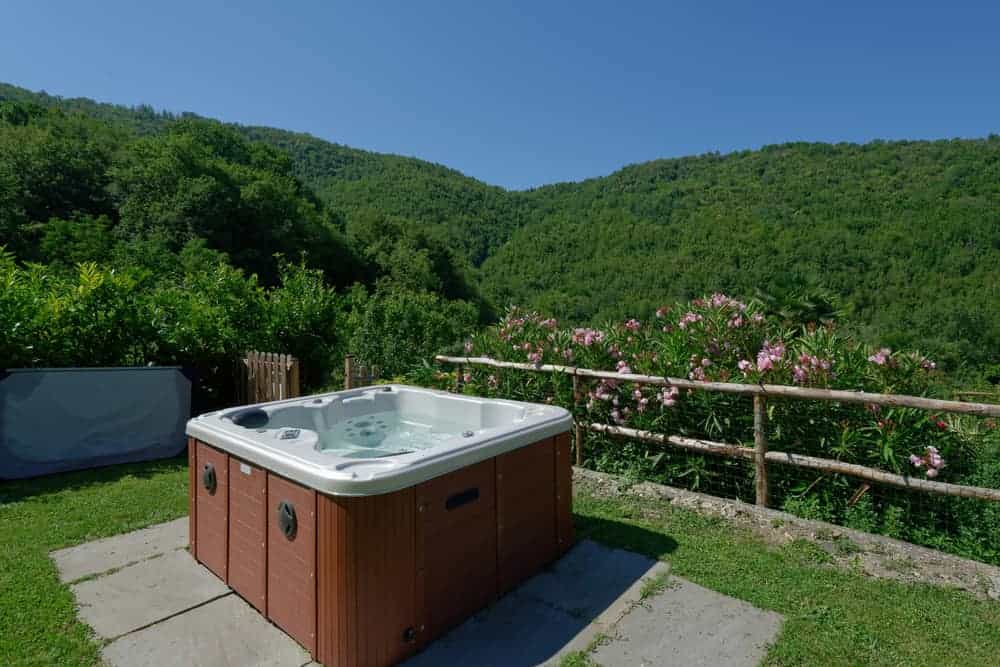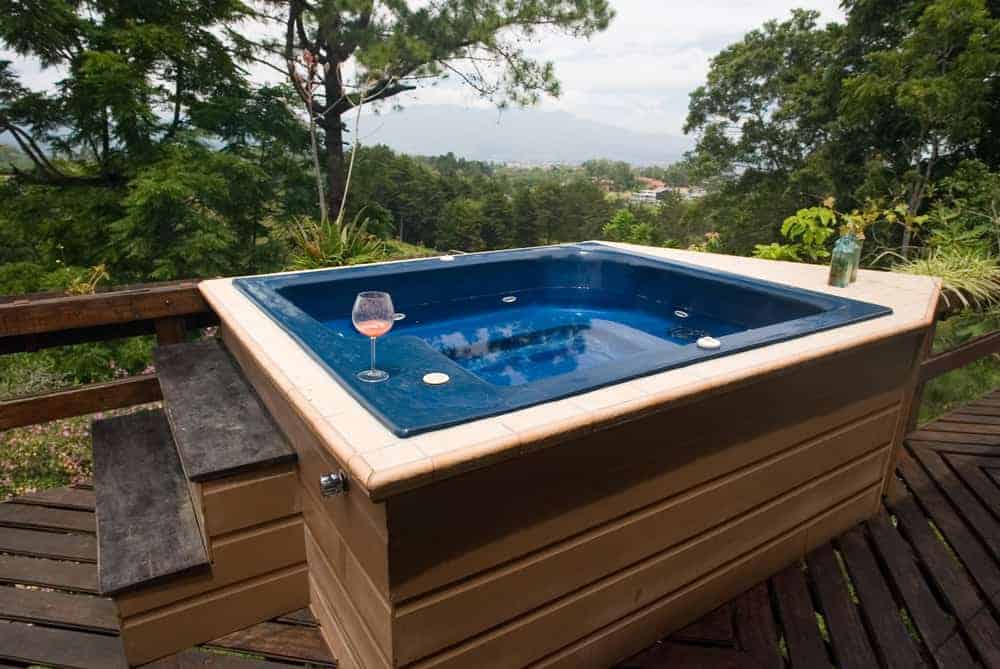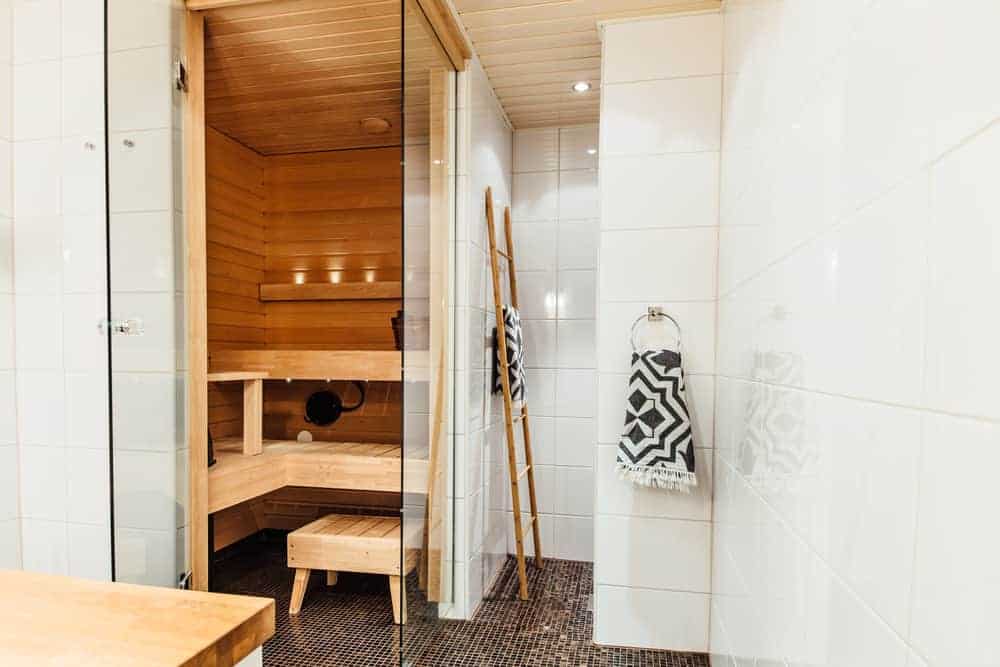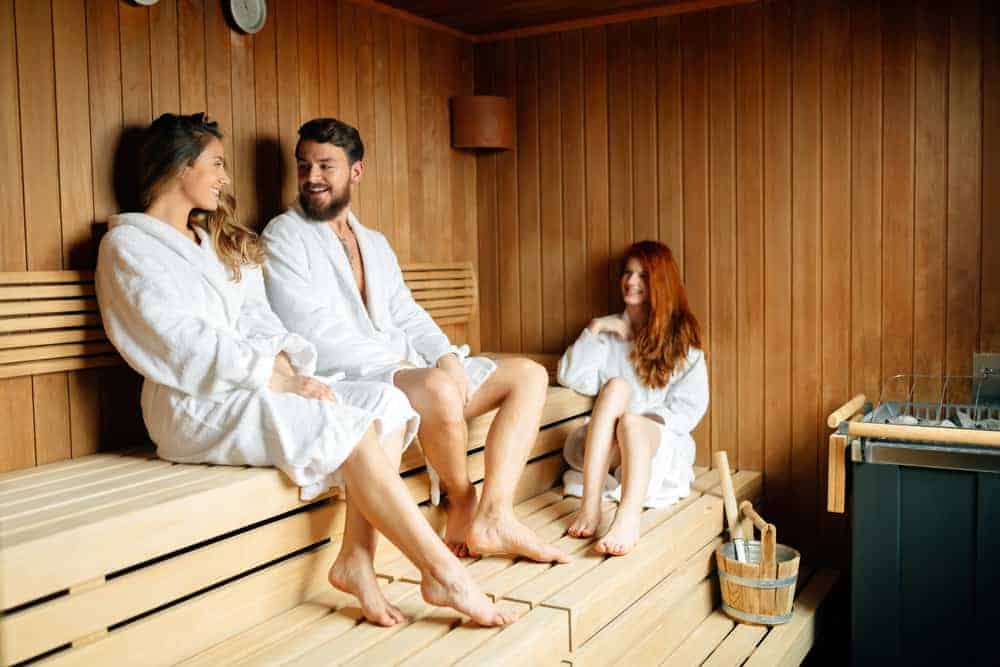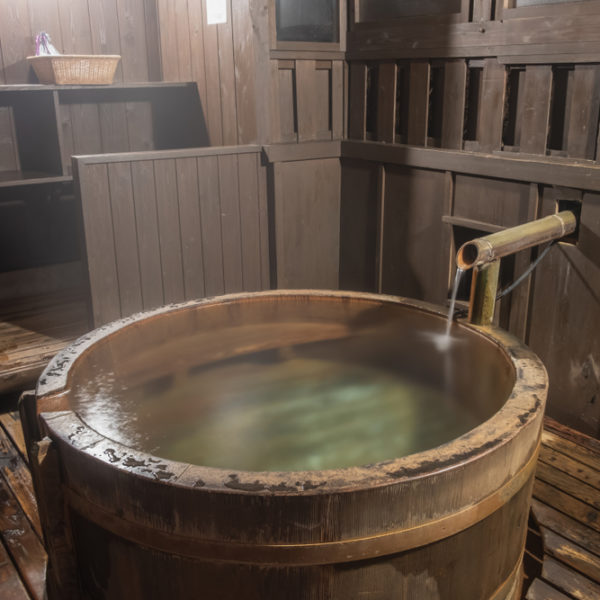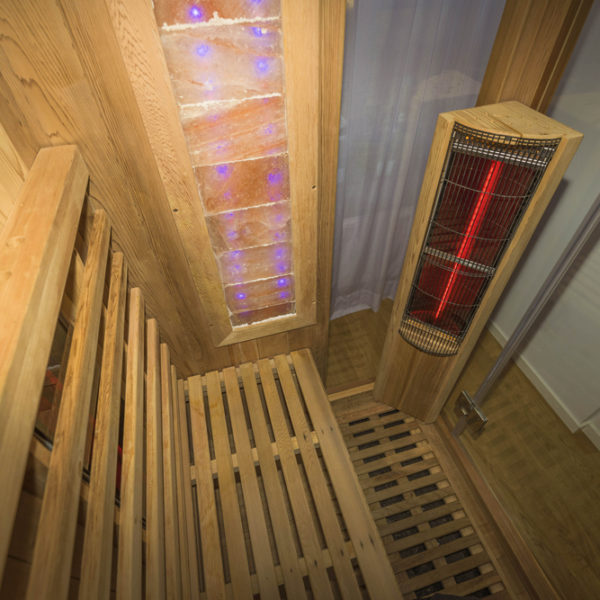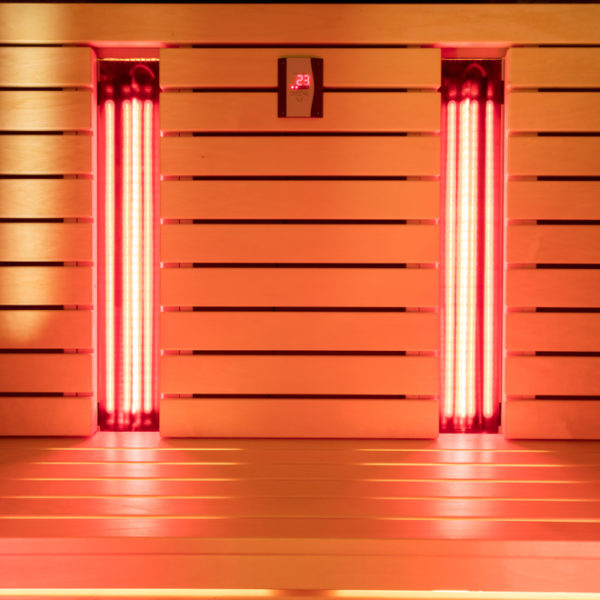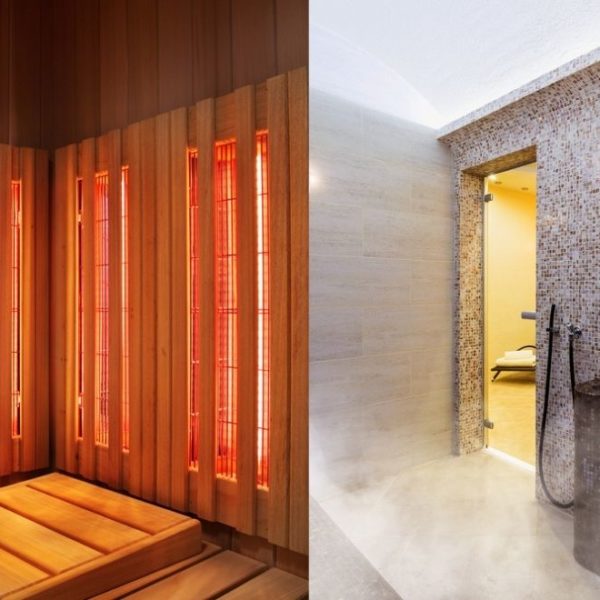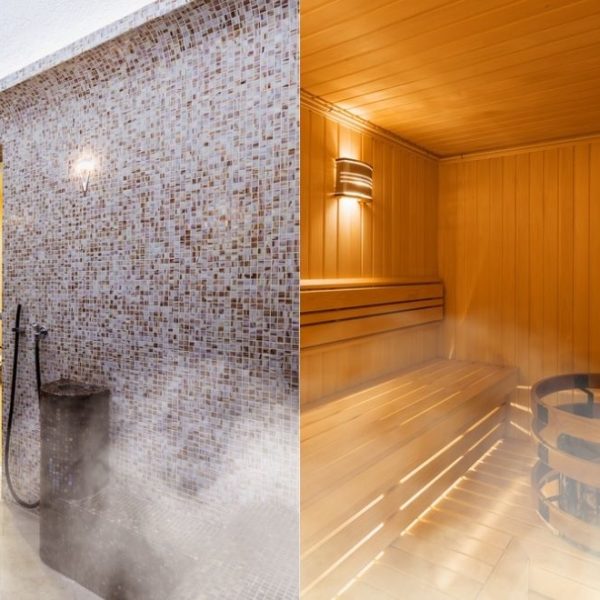If you spend time in a hotel, gym or spa, you may enjoy using the hot tub or sauna there as a way to relax, relieve stress and generally forget about all the pressures of your daily life.
Some people also might be inspired to install one in their home, and for those who can’t decide which option to go for, here we discuss the question of sauna vs hot tub to help you make up your mind.
If you’re looking for a preview of some of the stuff we’re going to be talking about, you can also check out this video before reading on.
Sauna vs. Hot Tub – Benefits
Hot tub and sauna aficionados will point to a long list of benefits, both proven and supposed, that are associated with them, so let’s have a look at the main ones now.
1. Benefits for the heart and circulation
One of the main health benefits of saunas is improved heart health and circulation.
By sitting in a sauna, you raise the temperature of your body, and your body responds by trying to cool itself. To do this, it increases your heart rate, which pumps more blood around the body and improves circulation.
At the same time, the heat also causes blood vessels to dilate, further enhancing circulation.
Through regular sauna use, this may lead to a reduced risk of sudden cardiac arrest, coronary heart disease and cardiovascular disease as well as lower blood pressure.
Since sitting in hot water will also raise your heart rate, you can expect to gain many of the same benefits from a hot tub – and the science also supports this supposition.
To give just one example, a study in Japan showed that regular hot tub use provided some protection against fatal and non-fatal cardiovascular events.
2. Relaxation, stress relief and mental health
Another benefit of saunas is their ability to provide relaxation and stress relief.
Even without scientific proof, the fact that spending time relaxing in a sauna leaves you feeling less stressed and in a better mood is intuitive.
Furthermore, if you use a sauna with other people, there’s also a social element, something that’s important for mental health.
Hot tubs also provide a great way to unwind, de-stress and forget about all the worries of your daily grind, and like saunas, they can also provide an opportunity for social interaction.
3. Relief from joint pain, rheumatic conditions and muscle aches
Anecdotal evidence from regular sauna users suggests they are something of a panacea for aches, pains, stiffness and rheumatic conditions – and again, the science seems to back this up.
In addition, many athletes use saunas to help them recover more quickly after training or competition since they can help relax muscles after strenuous exercise.
Sitting in warm water can also bring relief from stiff muscles, much like a sauna, and if you have massage jets in the tub, this can enhance the effect. Like saunas, hot tub therapy can help reduce the pain from rheumatoid arthritis too.
4. Skin conditions
Sauna users often report a skin “glow” after using a sauna, probably due to the increased blood flow to the skin and the opening of pores due to sweating.
Saunas can also help with dry skin and conditions like acne since they open the pores and moisturize the skin, giving the skin a deep clean.
Unfortunately, hot tubs don’t offer these benefits, and in fact, the chemicals in the water – along with any bacteria – may make skin worse, making this is a win for saunas.
5. Immunity boost
There is some evidence that saunas can help boost immunity – or at least resistance to the common cold. There is no similar evidence for hot tub use, so this is another win for saunas.
6. Better sleep
Both saunas and hot tubs are reported to help users get to sleep more easily and also to help them to enjoy more deep sleep, which is important for memory and the restoration of brain function.
7. Reduction of blood sugar in diabetes sufferers
Hot tubs have been shown to help lower blood sugar levels in people who suffer from type 2 diabetes. This is a benefit that saunas don’t provide.
Sauna vs. Hot Tub – Experience
Quite apart from the physical and mental health benefits of saunas and hot tubs, the experience of each is also quite different.
A sauna is a personal, more meditative experience as you sit quietly in the almost mysterious environment of dim lights and steam and just relax.
Because of the intense heat, you don’t tend to move about much, and most people don’t do much more than just sit there and sweat.
If you go to a public sauna, you might go with friends or family, in which case there will be a social element to it, and it can be a good moment to sit and chat. You might also like to talk to strangers, so there’s a certain amount of social contact.
However, due to the heat, saunas aren’t suitable for children, so it isn’t an activity for families to enjoy together – and since it’s a bad idea to drink alcohol in saunas, they don’t exactly lend themselves to a party atmosphere.
Hot tubs are more versatile. While you can sit quietly in a hot tub alone or with friends, you can also enjoy your tub with a drink in your hand and some lively music on – and if you add a bit of creative lighting, it will change the mood entirely.
This means you can invite friends over for a hot tub party, and if you don’t turn the heat up too much, kids can join you too, making it the kind of activity everyone can participate in.
Sauna vs. Hot Tub – Aesthetics and resale value
If you have a hot tub or a sauna installed in your home, the effect it will have on your property can be different.
Depending on where you install it, a hot tub may be visible to neighbors, especially if it includes colored lights – although most people will probably want to install theirs somewhere with a bit of privacy.
Alternatively, if you don’t have somewhere outside that’s hidden from view but you want to enjoy your tub away from prying eyes, you might choose to build an outdoor hot tub gazebo.
In any case, the fact that you have a hot tub will be obvious to anyone who comes to visit or to anyone who can see over your fence and into your yard, so having a hot tub will make quite a statement.
A sauna, on the other hand, is more discreet. You might have it installed inside your home, in which case, it won’t be obvious from the outside that you even have a sauna.
Alternatively, you might choose to construct an outdoor sauna in a specially-constructed building – but even so, it will be a more understated addition to your home than a hot tub.
In terms of how they can add value to your home when you come to sell it, real estate agents claim that having a sauna can make your house worth more. Hot tubs are more complicated, and it can depend on the neighborhood, local demographics and other factors.
Sauna vs. Hot Tub – Installation
There are several ways to install a sauna in your home, but most people opt for buying a prefab kit. You can then fit it DIY if you have the necessary skills, or you can have professionals do it for you.
You will probably need to pay an electrician to wire in the light and switch as well as the heater. If you choose a gas-powered version, you will also need to call in a plumber.
Finally, the walls and ceiling will need the proper paneling and insulation, and you’ll need to ensure your sauna has proper ventilation.
Generally speaking, the installation part is more complicated with saunas.
Hot tubs are usually easier, partly because many people choose to locate theirs outside in their yard.
This means you don’t need to have a special enclosure or building constructed – all you need is somewhere with a level surface that can support the weight of the tub and the water.
Hot tubs don’t necessarily need to be plumbed in since you can just fill them with a hose. However, the pump and filter systems will require electricity.
If you choose a “plug-and-play” 110V version, you can just use mains electricity – but a more powerful 220V tub will require the services of a professional electrician.
Note that if you want an indoor tub, you will probably have to build an extension as the tub will usually need to be installed first before the walls are built around it.
Choosing an indoor tub is more complicated since you have things like the floors, the walls and drainage to consider.
Sauna vs. Hot Tub- Maintenance
Maintenance for both saunas and tubs is relatively simple.
Daily maintenance for saunas is minimal. You just need to leave the door open or ensure there is enough airflow to allow it to dry when you’re not using it. However, the wood walls will need treating perhaps every six months, and they will also need replacing every few years.
Tubs require more looking after. You need to monitor the water chemistry at least twice a week, and you’ll also need to add chemical products to alter the chemistry if it’s not right.
Then there’s the filter, which will need to be removed and cleaned or replaced as required – and you’ll need to keep a constant eye on it to check when this happens.
Finally, you’ll also need to change the water every few months, even if you look after it with the proper chemicals and keep the filters clean.
Sauna vs. Hot Tub – Costs
In terms of installation, a kit for a four-person sauna will probably set you back something in the region of $2500-$3500. If you DIY most of it, you’ll still need to pay up to around $700 for professional help – but for full pro installation, you’re looking at anything like $1500-$3000.
Of course, if you want the cheapest option, a simple infrared sauna blanket can give you many of the same benefits for much less – expect to pay only around $500 for a high-end model.
A four-person hot tub will probably cost something like $3000-$8000, depending on the model. However, installation will be cheaper, costing around $300 if you do some of the work yourself or $500 if you get pros to do all the work.
However, when installed, running a sauna will probably cost you a lot less. Since you only turn it on when you use it, it can cost as little as $0.50 an hour.
Conversely, hot tubs need to be left on all the time, and depending on how energy efficient yours is, you can expect an increase in your electricity bill of around $20-$30 a month.
Sauna vs. Hot Tub – Risks
As long as you use them responsibly, there aren’t any major risks associated with either hot tubs or saunas.
Since both involve heat, there is the risk of dizziness when standing up after sitting in a hot tub or sauna – but as long as you take it easy, this is not usually a problem.
It’s recommended to avoid alcohol when using hot tubs and saunas. However, lots of people drink in hot tubs, and as long as you’re sensible, it shouldn’t be a big deal. With saunas, though, this can place you at greater risk of dehydration, so you need to be careful.
Saunas especially can increase your blood pressure, and if you have a weakened heart, you may be at higher risk of having a heart attack. This doesn’t mean you shouldn’t use a sauna, but you should at least check with your doctor first.
Pregnant women should usually avoid saunas and hot tubs since they may put the unborn baby at risk. At the very least, check with your doctor before going in.
Finally, men should be aware that hot tubs can cause temporary infertility due to the increased heat – but the effects are short-lived.
Final words
Both saunas and hot tubs are enjoyable ways to relax and unwind, and both offer a range of physical and mental health benefits.
Both also have several other advantages and disadvantages, so if you’re wondering whether to install a sauna or a hot tub in your home, the best advice is to weigh up these factors and consider what’s most important to you – and then let this guide you in your choice.
